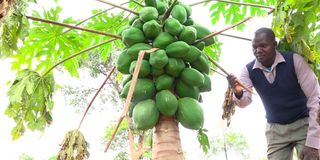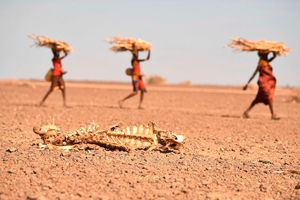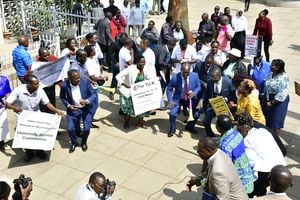Reseachers team up with farmers to bring degraded land back to life

Isaiah Pkiach, a farmer from Senatwo, West Pokot County, at his pawpaw farm.
What you need to know:
- The area is prone to intense heat, prolonged droughts, landslides and floods. And now university researchers are working with the local communities to reverse this trend.
- Through the project, they construct sand dams and terraces ; conserving soil and promoting food security in the region. They also plant fodder, fruits and indigenous trees to increase forest cover and reduce soil erosion.
BY STANLEY KIMUGE AND ANNABEL OBALA
Isaiah PKiach walks as he admires different crops on his farm in Senetwo village, West Pokot County.
He recounts days when the area experienced water scarcity, which forced people to travel long distances in search of the commodity. The water table had receded following years of wanton destruction of trees. “Water was a serious problem since most streams had dried up. This place was becoming inhabitable due to lack of water and food. The heat was also intense and some of us had thought of relocating,” says Pkiach.

Gullies caused by soil erosion in Senatwo, West Pokot.
However, he now runs a tree nursery of more than 2,000 seedlings that include fruit trees and indigenous trees.
In this village, hundreds of gullies have formed and spread over the years, thanks to human activities like charcoal burning, deforestation, over-grazing and unsustainable sand harvesting practices. The massive land degradation has left the region with deep gullies that cannot support agricultural activities.
To mitigate this, a team of researchers from the University of Eldoret have partnered with residents to rehabilitate the land by constructing terraces, sand dams and planting crops and pasture. Together with members of Rikor community group, they embraced the project four years ago and the situation is now getting better. Rikor means to ‘protect the land’ in Pokot language. About 12 groups have benefited from the project.

Community members construct a sand dam in Senatwo, West Pokot.
“When researchers arrived here, we had no idea about this. They taught us how to rehabilitate land and took us to Machakos to learn about the initiative. Since then, streams are now flowing again and water levels in the rivers have improved, water is no longer a problem. This place is now greener,” says Pkiach.
The soil and water conservation project was implemented to transform the arid land to become economically viable. It was funded by the US-based McKnight Foundation and implemented by soil scientists from the public university.
Since 2014, the project dubbed Dry Lands Farmer Research Network (FRN), a farmer-led research initiative in Chepareria, West Pokot County, involves local farmers joining hands to rehabilitate the land. The project was implemented in three phases. It was extended for another phase to cover more areas.
Initially, the locals were not practising agro-ecological practices This is farming sustainably where there is inter-dependence at the farm level. For instance, the use of livestock manure to improve soil fertility while producing fodder for the animals and food crops for the locals. This helps in soil regeneration and water conservation. The use of chemical fertilisers is discouraged.
Residents have now embraced such practices, where they produce their own food on their small parcels of land.
Priscila Chepkemei, another resident, has planted crops like cassava, sweet potatoes, pawpaws and bananas. She also has Boma Rhodes and Bracharia grass for her livestock. The grass helps to hold together soils thus preventing soil erosion.
“We are now able to harvest fruits and other crops from our farms and stop land degradation. We sell the produce and make money while also getting a balanced diet for our families,” says Priscila, a resident from Senatwo.
The area is prone to intense heat, prolonged droughts, landslides and floods. And now university researchers are working with the local communities to reverse this trend.
Through the project, they construct sand dams and terraces ; conserving soil and promoting food security in the region. They also plant fodder, fruits and indigenous trees to increase forest cover and reduce soil erosion.
"Initially, we were being informed by the community that this river was the only permanent river in the region and people would come all the way from Kolerach to fetch water here,” says Dr Harrison Churu, a soil scientist at the University of Eldoret. “Our interventions have helped to restore degraded land.”
He adds that the harvesting of sand and stones in the rivers had become rampant, leading to land degradation and rivers to dry.
“The stones and sand help to reduce the speed of the river water. If it is not controlled, the gullies will continue to be deeper and widen even further,” says the expert.
Prof Wilson Ngetich, lead researcher and deputy Vice-Chancellor at the University of Eldoret, told Healthy Nation that the initiative entails collaboration between experts and the local communities to address adverse effects of climate change and land degradation.
"It’s all about a researcher and the farmer sitting together and creating the solution. In most cases, farmers have been able to organise themselves and take the lead in addressing degradation,” he says.
According to Dr Churu, so far 720 households have benefited. The project has 173 terraces, 11 stone gabions, 11 community tree nurseries and 107 sand dams .
Samuel Kapelyorok, senior assistant chief of Korellach, says they are working to develop a community policy on sand harvesting to regulate the practice so as to rehabilitate the land.
“We have proposed that we will not allow sand harvesting at night. Lorries should also be banned from dumping dirt in the rivers,” he notes.






